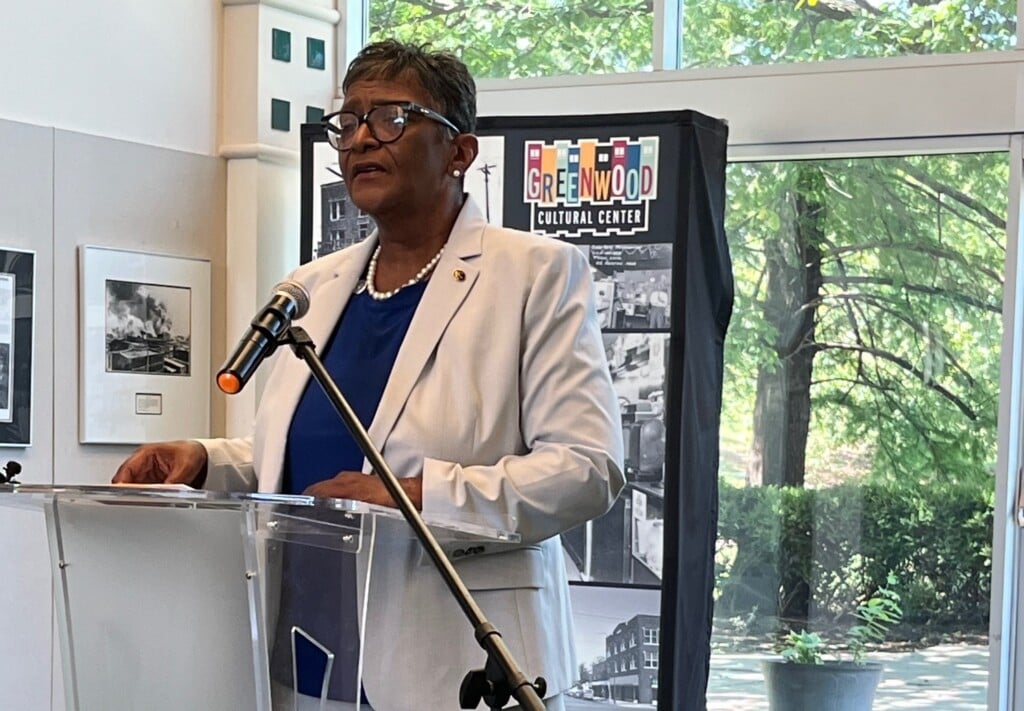The TPS Audit Shows Shocking Mismanagement

After an almost two-and-a-half year wait, State Auditor and Inspector Cindy Byrd’s report on Tulsa Public Schools is out. The audit covers the years 2015 – 2023, during Deborah Gist’s tenure as superintendent. In her report and in her news conference in Oklahoma City, Byrd alluded to TPS putting obstacles in the way of the process, thus slowing her work.
It was noted that one reason for the obstruction was the TPS administration’s use of private channels such as Slack and Google docs to communicate, thus keeping information from the public and not storing it as an email of public record.
Overall, the audit found: TPS had a systemic lack of internal controls and administration over their purchasing process. Both the administration and the Board failed to provide adequate oversight of the process. Audit results, identifying over 1,400 discrepancies, were concerning. These issues spanned almost eight years, documenting a long-term lack of management oversight.
The systemic lack of internal controls may be blamed on naivete, inexperience or corruption. Maybe all of the above. I also see a big dose of hubris in all of it. There is, I believe, some value in looking at the context in which the mismanagement occurred.
The audit covers the years that Superintendent Deborah Gist was in charge of the district. She had left Rhode Island with a vote of “no confidence” from the teachers there. I was curious about her because my first encounter with her was at Circle Cinema. She was part of a discussion, along with then State Superintendent Janet Barresi, of the charter propaganda film “Waiting for Superman.” Both leaders praised charter schools and the school reform/privatization movement headed by the Walton, Gates and Broad Foundations. Not long after that presentation, Gist was named, behind closed doors, as TPS Superintendent.
Broad at TPS
Gist was a 2008 graduate of the Broad Academy, a then-unaccredited training ground for superintendents who would be placed in cities throughout the U.S. to promote the Broad Foundation agenda of school reform. Broad-trained administrators used a business model, or “portfolio” model for public school districts.
In 2019, the foundation bought itself a place (and I would say the veneer of legitimacy) at the Yale School of Management at Yale University with a $100 million gift.
Here is a section from the audit report regarding Broad:
The District’s association with the Broad Academy was scrutinized due to the organization’s relationship with District employees. TPS collaborated with the Broad Center to employ their graduates and perspective students. A benefit of employing these individuals was that a portion of the recruited Broad residents’ salary was supplemented by The Broad Center. (highlighting mine) TPS received payments totaling $554,772 from the Broad Center. The Foundation also supported employee participation in the Broad Academy, a continuing education process, by covering travel expenses and supporting salaries. TPS hosted social gatherings for Broad Academy residents and the Foundation provided financial support for the activities. A sample of Foundation records show at least $11,283 was paid for Broad related meals, drinks, and entertainment. TPS hosted events in August 2018 and again in March 2020, where Broad Cohorts from across the nation attended meetings in Tulsa. The multiple-day programs featured meetings at Tulsa locations where Broad Cohorts participated in multiple sessions and programing which included a Child Equity Index Exercise, and an event titled “DEI at Night.” In addition to the recruitment program, TPS utilized at least 23 different vendors with Broad Academy connections. The majority of these vendors did not have a relationship with TPS prior to the hiring of the Broad related alumni. Between SY2016 and SY2023, TPS paid these various vendors more than $6.2 million for consulting services.
I wrote a blog in 2016 about TPS and the Broad Academy. You can read it here: tulsakids.com/the-broad-foundation-lands-at-tps-should-parents-care
In that blog, I quoted Seattle parent Sue Peters, who posted the following on parentsacrossamerica.org:
What’s striking is the similarity of the reigns of terror and error of these Broad ‘graduates.’ Disturbingly so, in fact. Many of the above earned No Confidence votes from their district’s teachers, and from parents too. All meted out a top-down dictatorial approach. Most alienated parents. Many closed schools. A number had questionable audits on their watch. (highlighting mine) More than one had false or questionable data to support their reforms. All commanded large salaries with perqs (sic), while at the same time slashing services for kids and closing schools in the name of financial scarcity. A number of them avoided informing the elected school board of their plans or actively withheld information from them, effectively bypassing democracy.
Scandal, controversy, animosity followed them all, inevitably out the door.
While this list is quite long, I’m going to repost Sue Peter’s list of commonalties among Broad superintendents below – a list that I posted on my blog in 2016. Much of it sounds familiar in hindsight. You can see that most relate to the TPS District and ultimately to the problems found in this audit.
Peters writes: To help our fellow school districts throughout the nation, here is a guide to diagnose whether your school district has come under the influence of the Broad Foundation (and what you can do about it).
How to tell if your School District is Infected by the Broad Virus
- Schools in your district are suddenly closed.
- Even top-performing schools, alternative schools, schools for the gifted, are inexplicably and suddenly targeted for closure or mergers.
- Repetition of the phrases “the achievement gap” and “closing the achievement gap” in district documents and public statements.
- Repeated use of the terms “excellence” and “best practices” and “data-driven decisions.” (Coupled with a noted absence of any of the above.)
- The production of “data” that is false or cherry-picked, and then used to justify reforms.
- Power is centralized.
- Decision-making is top down.
- Local autonomy of schools is taken away.
- Principals are treated like pawns by the superintendent, relocated, rewarded and punished at will.
- Culture of fear of reprisal develops in which teachers, principals, staff, even parents feel afraid to speak up against the policies of the district or the superintendent.
- Ballooning of the central office at the same time superintendent makes painful cuts to schools and classrooms.
- Sudden increase in number of paid outside consultants.
- Increase in the number of public schools turned into privately-run charters.
- Weak math text adopted (most likely Everyday Math). Possibly weak language arts too, or Writer’s Workshop. District pushes to standardize the curriculum.
- Superintendent attempts to sidestep labor laws and union contracts.
- Teachers are no longer referred to as people, educators, colleagues, staff, or even “human resources,” but as “human capital.”
- A (self-anointed, politically connected) group called NCTQ comes to town a few months before your teachers’ contract is up for negotiation and writes a Mad Libs evaluation of your districts’ teachers (for about $14,000) that reaches the predetermined conclusion that teachers are lazy and need merit pay. [“The (NAME OF CITY) School District has too many (NEGATIVE ADJ) teachers. Therefore they need a new (POSITIVE ADJ.) data-based evaluation system tied to test scores…”]
- The district leadership declares that the single most significant problem in the district is suddenly: teachers!
- Teachers are no longer expected to be creative, passionate, inspired, but merely “effective.”
- Superintendent lays off teachers for questionable reasons.
- Excessive amounts of testing introduced and imposed on your kids.
- Teach for America, Inc., novices are suddenly brought into the district, despite no shortage of fully qualified teachers.
- The district hires a number of “Broad Residents” at about $90,000 apiece, also trained by the Broad Foundation, who are placed in strategically important positions like overseeing the test that is used to evaluate teachers or school report cards. They in turn provide — or fabricate — data that support the superintendent’s ed reform agenda (factual accuracy not required).
- Strange data appears that seems to contradict what you know (gut level) to be true about your own district.
- There is a strange sense of sabotage going on.
- You start to feel you are trapped in the nightmarish Book Five of the Harry Potter series and the evilly vindictive Dolores Umbridge is running your school district. Seek centaurs and Forbidden Forest immediately!
- Superintendent behaves as if s/he is beyond reproach.
- Superintendent reads Blackberry (Goodloe-Johnson, also see comments) or sends texts (Brizard, see comments) while parents and teachers are giving public testimony at school board meetings, blatantly ignoring public input.
- A rash of Astroturf groups appear claiming to represent “the community” or “parents” and all advocate for the exact same corporate ed reforms that your superintendent supports — merit pay, standardized testing, charter schools, alternative credentialing for teachers. Of course, none of these are genuine grassroots community organizations. Or, existing groups suddenly become fervidly in favor of teacher bashing, merit pay or charter schools. Don’t be surprised to find that these groups may have received grant money from the corporate ed reform foundations like Gates or Broad.
- The superintendent receives the highest salary ever paid to a superintendent in your town’s history (plus benefits and car allowance) – possibly more than your mayor or governor — and the community is told “that is the national, competitive rate for a city of this size.”
- Your school board starts to show signs of Stockholm Syndrome. They vote in lockstep with the superintendent. Apparently lobotomized by periodic “school board retreat/Broad training” sessions headed by someone from Broad, your school board stops listening to parents and starts to treat them as the enemy. (If you still have a school board, that is — Broad ideally prefers no pesky democratically elected representatives to get in the way of their supts and agendas.)
- Superintendent bypasses school board entirely and keeps them out of the loop on significant or all issues. (highlighting mine)
- School board candidates receive unprecedented amounts of campaign money from business interests.
- Annual superintendent evaluation is overseen by a fellow name Tom Payzant.
- Stand for Children appears in towns and claims to be grassroots. (It is actually based in Portland, Ore., and is funded by the Gates Foundation.) It may invite superintendent to be keynote speaker at a political fundraising event. It will likely lobby your state government for corporate ed reform laws.
- Grants appear from the Broad and Gates foundations in support of the superintendent, and her/his “Strategic Plan.”
- The Gates Foundation gives your district grants for technical things related to STEM and/or teacher “effectiveness” or studies on charter schools.
- Local newspaper fails to report on much of this.
- Local newspaper never mentions the words “Broad Foundation.”
- Broad and Gates Foundations give money to local public radio stations which in turn become strangely silent about the presence and influence of the Broad and Gates Foundation in your school district.
THE CURE for Broad Virus:
- Parents.
- Blogs.
- Sharing information.
- Vote your school board out of office.
- Vote your mayor out of office if s/he is complicit.
- Boycott or opt out of tests.
- Go national and join Parents Across America.
- Follow the money.
- Question the data – especially if it produced by someone affiliated with the Broad or Gates Foundations or their favored consultants (McKinsey, Strategies 360, NCTQ, or their own strategically placed Broad Residents).
- Alert the media again and again (they will ignore you at first).
- Protest, stage rallies, circulate petitions.
- Connect and daylight the dots.
– Sue Peters
In a blog that I wrote in 2016, which you can read here — tulsakids.com/the-broad-foundation-in-tulsa-and-oklahoma-city — I listed the TPS administrators who were Broad Academy grads that Superintendent Gist brought in. Remember, according to the audit, the Broad Foundation paid part of the salaries for many Broad hires.
In 2016 I wrote: A quick check of Tulsa Public School administrators who are Broad alumni include Superintendent Deborah Gist, Devin Fletcher, Jorge Robles, Nolberto Delgadillo, and Andrea Castaneda.
At the time, former superintendent and historian John Thompson was writing about the Broad Academy in Oklahoma City. Thompson points out the TPS had 11 Broad hires, most of whom had no background in education or school administration. At the time, Jorge Robles had just been hired from Denver with a hefty moving allowance and bonus, which, according to the audit, had not been approved by the TPS board.
Thompson wrote:
And then came the Oklahoma teacher walkout and the conversations with educators who had similar experiences with Broad graduates. Although we appreciated Tulsa superintendent Deborah Gist’s (class of 2008) support for a teacher pay raise, she presided over a district with ten Broadies in leadership positions. (The hiring of another, from Denver, was announced last week, bringing the total to 11.) Despite the large number of Tulsa’s advantages in comparison to Oklahoma City, it is near the bottom of the nation’s urban schools in increasing student performance. When I hear from Tulsa teachers about the micromanaging imposed by the Broad-dominated administration, it’s hard to believe that their mandates haven’t undermined teaching and learning.
This prompted a survey of secondary sources, and an inventory of how and why other Broad graduates were dismissed or forced to resign. As with Oklahoma educators who finished each other’s sentences when discussing their Broad graduates, reporters across the nation used very similar language in describing the careers of their cities’ Broad superintendents. It was shocking to read how many of them played fast and loose with the facts before and after being hired, ruled their systems in similar ways, and left office in a comparable manner.
It would take a far more detailed study to determine whether Broad superintendents behave the way they do based on the personalities that they brought to the academy, as opposed to determining what it is about the organization that recruits such people and trains them to operate in such similar ways. I assume it is a combination of the two factors – it takes a certain type of mindset to advance in the corporate reform system, and there is something about the Broad world which turns out certain types of leaders.
You can read Thompson’s blogs beginning here: dianeravitch.net/2018/05/17/john-thompson-the-broad-superintendents-and-their-agenda-part-1
Highly Paid Consultants
Understanding how the Broadies work and how they grease the palms of their favorite consultants and programs is important to understanding how TPS spent millions for equity (as they claim). I’ve yet to see it, but I would love to see a more equitable public school system.
When I was writing about this nearly eight years ago, teachers were complaining about consultants in their classrooms. I talked to a group of speech therapists who were beside themselves trying to work with the kids while being berated by a consultant. They said that untrained “teachers” didn’t understand IEPs and students were going without services for months. Others were getting services who didn’t need them.
The audit shows that lack of oversight involved overpaid consultants, improperly written and submitted invoices, fraud, lack of transparency to the TPS Board, using the TPS Foundation as a pass-through to avoid proper invoicing, over $25 million paid to vendors/consultants without following Policy 5202, not itemizing invoices and using monthly payments to vendors “without itemizations or proof of goods or services provided.”
Two employees and one appointed TPS Board member were cited as having conflicts of interest. Chris Hudgins and Paula Shannon both established businesses during their employment with TPS, and used those businesses to profit from TPS.
Jania Wester, a TPS Board member worked for a nonprofit that benefitted from TPS funding and voted on funding that directly benefitted a nonprofit run by her husband.
During that time, Board Member Jennettie Marshall requested that Wester recuse herself from the vote, but was told there was no conflict of interest. The audit found that Wester’s vote helped procure $390,000 for her husband’s nonprofit.
Post-Audit Press Conference
Two TPS Board Members, Jennettie Marshall, currently the longest-serving member, and E’lena Ashley, called for the audit because they were not getting clear answers on budget items. Marshall had been asking for additional budget information for years, refusing to be a rubber stamp for Superintendent Gist’s budget. Her requests were repeatedly dismissed by former Board President Suzanne Schreiber, current President Stacey Woolley and Board Member John Croisant.
After Devin Fletcher, chief talent and learning officer, was convicted of creating false invoices to steal from TPS, Marshall and Ashley felt it was more important than ever to find out if there were other violations. Violations that Marshall’s gut told her were happening.
Speaking at a press conference called by Marshall on Sunday, March 2, at Greenwood Cultural Center, Ashley said that she and Marshall had invited other board members to sign on to the audit, but they refused.
Marshall and Ashley described being “frozen out” by the board after calling for the audit. Marshall said she was called “obstructionist” and “a conspiracy theorist.” She said that her main concern was getting complete information from the administration so that she could, in good conscience and as a good representative of the community, vote on the budget.
“I was not getting the information prior to board meetings,” Marshall said. “And I wanted it on public record that I was asking these questions.”
Marshall said that sometimes the requested information would not be given to her in a timely manner, so she would have to vote in a board meeting without having had time to review the materials. Ashley echoed these concerns.
“I believe the auditor was spot on when she placed the blame on the board for not meeting its fiduciary responsibility,” Marshall said. “I believe there was much more that could have gone in the audit, especially regarding the use of bond money, which is voted on by the public for specific purposes.”
She gave the example of closing Jones Elementary after a bond had been approved to expand the school. “We went to the public for additional funding to expand the school due to overcrowding, but it was shifted to something else.”
“We have been failed not only by Tulsa Public Schools and their policies and practices, but especially by that finance committee,” Ashley said.
Consultants
The audit shows more than $37 million in expenses TPS made from 2015 to 2024. Of that, $29 million went to consultants. There were 900 invoices and 90 vendors.
The audit found that consultants did not follow proper procedures, policies or laws when presenting invoices to the district. For example, a consulting contract for Collaborative for Academic Social and Emotional Learning (CASEL) was budget-based, rather than service-based. CASEL was paid $12,500 a month for “a consulting agreement” without itemizing or providing information on services.
TNTP invoiced in a similar way. TNTP’s total budget was $1,203,629, divided into four payments of $300,907. Again, no itemization of services.
According to the audit, TNTP was contracted to create a “TPS operated teacher preparation/alternative certification program. TPS paid TNTP more than $8.5 million between SY2015 and SY2023.”
The audit found that the Tulsa Teacher Corps “was operated for two years prior to receiving official authorization through legislation and the State Board of Education. During this period, Teacher Corps trainees provided instruction in summer classrooms without meeting the necessary statutory requirements.”
Moreover, the audit found that trainees did not have written contracts, were not properly certified “and not all had obtained the required OSBI background check.”
The auditor writes: From the program’s inception, TPS administrators took extraordinary measures to avoid directly hiring and paying trainees. This included bypassing board approved contracts and using vendors, such as TNTP and Snickelbox, to pay trainees, keeping them off the District’s payroll. In 2018, TPS did not intend to hire the trainees until they had completed the program. However, they wanted to ensure the trainees were compensated. To achieve this, Hendricks, Fletcher, and Shannon coordinated with TNTP and the Foundation to bypass TPS and use a vendor to disburse the 2018 stipends.
When TPS took over paying trainees and TNTP stepped back, “trainees were paid as vendors through board approved purchase orders,” but still did not have teaching contracts.
The audit says: The District should not have used their vendor relationships to circumvent law or policy for the payment of stipends. This behavior further contributed to the mismanagement, waste, and eventually the misappropriation of funds.
TPS overpaid Teacher Corps trainees a total of $35,640.
I encourage you to read the entire audit and go down the list of consultants and consulting programs — WestEd, YSD Consulting, Achievement Network — that were receiving millions without following proper invoicing laws and procedures. You would probably find many of these same consultants being used in other Broad districts.
As Marshall put it, “If my son asks me for $100, I want to know what that’s for.”
Nonprofits
Nonprofits that provided services for TPS were also paid without proper itemized invoicing. More than $37 million was expended through various nonprofit vendors including Growing Together, Teach for America, Educare, Reading Partners, City Year Tulsa, and Community in Schools Mid-America (CIS).
For example, Growing Together was paid $1.2 million between 2020-2023 without providing proper invoicing and without detailing the services, or whether those services were even provided to students. The audit states: TPS was unable to provide documentation verifying that services paid for were actually provided. Paula Shannon stated that TPS did not have access to the “rich sets of reports and data generated by CIS Mid America and Growing Together CIS.” This was data paid for by the District. Shannon subsequently added that TPS administrators typically reviewed data quarterly to understand the services delivered and students served. However, principals engaged weekly with site coordinators who carry caseloads of students. There was no evidence that either principals or purchasing staff confirmed that services billed for were received or that the contract requirements were met.
TPS also paid Growing Together $108,652 for outreach services without providing proper invoicing, $42,089 of which went to administrative costs.
Another nonprofit, The Opportunity Project, a partnership between TPS and the Tulsa Community Foundation (TCF), serves as a liaison between organizations that provide afterschool programs and TPS. The audit states: Between SY2020 and SY2023 TPS paid TCF a total of $6,157,346 for Opportunity Project services. The Wallace Foundation provided an additional $1,995,219 and the Foundation paid $65,00027 toward data work. In total, $8.217 million was dedicated to the out-of-school programs managed by the Opportunity Project during the four-year period. The Opportunity Project did not provide services for any other school districts during the contract years.
Administrative costs for the Opportunity Project were significant. Administration cost in 2021-22 totaled $871,043. In contract year 2022-23, the administration cost was $944,033.
I have to wonder how much more could have been done to provide afterschool programs for TPS students if the almost $2 million could have been used for them instead of administrative overhead.
Not only did overhead eat up more than 30% of The Opportunity Project’s budget, but, like Growing Together, the invoicing did not follow proper policies and procedures. Because of the lack of oversight, the auditor found that The Opportunity Project overbilled TPS a total of $96,401 for services during SY2022.
The Bike Club, one Opportunity Project vendor, was given a donation of $30,000 through TPS and then was reimbursed $14,400 from The Opportunity Project, which then turned around and billed TPS for $33,600. Ultimately, this resulted in TPS overpaying The Opportunity Project $14,400, and the donor being paid back for the donation.
I hope the school board will ask questions when they see “privately funded” or the like on the consent agenda, especially since Jennettie Marshall will be leaving the board this year. As she pointed out, foundation money becomes public money when it is spent on Tulsa Public Schools, so the board and the public have a right to know where that money is going and to whom. Many of the consultants and programs are labeled as “privately funded” or similar wording, and questioning that was not encouraged or invited.
These are not small amounts of money. Auditor Byrd stressed that the audit did not look at curriculum or teachers or what they were teaching. The audit looked at financial management and whether laws, policies and procedures were being followed. It found a culture of financial mismanagement, and the programs and consultants in all areas, including equity, were paid hundreds of thousands of dollars to what end? It would be fair for the public, especially those with children in TPS, to ask whether they think this was good use of funds. Did these consultants really help the children of the district? Was the equity needle moved at all? Could the administration not have asked for better, more professional, less expensive, local consultants from Northeastern State, Oklahoma State or the University of Oklahoma?
Bonuses
The finding from the auditor was the following: Bonus payments, totaling $504,000, were obtained by TPS for employees through the Foundation without the required contracts.
Administrators Paula Shannon, Andrea Castaneda, and Jill Hendricks each signed a Retention Bonus Agreement that established the terms of their continued employment, indicating the bonus payments were part of their overall compensation and depended on their ongoing employment. Each agreement was issued on TPS letterhead and required the employee’s signature. Shannon received $45,000 in bonus payments. The first payment of $10,000, dated July 29, 2015, was issued before her hire date of August 3, 2015. She received an additional payment of $35,000 on May 3, 2021. Castaneda received a recruitment bonus of $10,000 in June 2017 and signed a retention bonus agreement for $35,000 in August 2021. Hendricks signed a retention bonus agreement for $25,000 in July 2021. When interviewed, Chief Financial Officer Jorge Robles claimed he was not aware of the bonus payments, although he received a $25,000 payment on May 9, 2018. The payment consisted of $10,000 for his relocation from Denver and a three-year employment incentive of $15,000. Robles was offered a base salary of $150,000. (An email exhibited in the audit) dated May 9, 2018, between Fletcher and the Foundation clearly states the bonus paid Robles was directly tied to his employment for the upcoming 3-year period. Bonus payments to all four of these individuals should have been included in their contracts as required by statute.
TPS retained 33% of the employees who received the recruitment or retention bonus payments, 40% of these employees did not continue their employment for more than five years, with 25% remaining for less than two years. Three employees received payments totaling $29,000 for working less than one year. Sixteen of the 40 bonus payments, totaling $221,000, were issued to Broad Center – Yale School of Management fellows. Only one of the 16 Broad alumni remains with the District.
If these employees had been doing exemplary work for the district, bonuses to keep them might be understandable. But these employees did even stay with the district. And what was Jorges Robles doing as Chief Financial Officer? He certainly wasn’t guarding the money flowing in and out of TPS. Based on these administrators, I would say the Broad Academy does a poor job of preparing individuals for work in urban school districts.
There’s More But You Should Read it Yourself
sai.ok.gov/Search%20Reports/database/TPS%20Audit%20Report%20web%20final.pdf
There are those who may say the audit is political or that it is about DEI. I, personally, think there should be more focus on DEI, but the audit is about disturbing financial mismanagement and fraud at Tulsa Public Schools, not about curriculum. Auditor Byrd made it clear that she was only looking at how the finances were handled. If some wish to make it about politics, that is a distraction. I would say, look at the facts of the audit. I know that many individuals on opposing sides of the politics all wanted this audit. It speaks for itself. If an organization or an individual uses it for political reasons, that’s on them.
Teachers should feel angry. The public should feel angry. Millions of misspent dollars could have been used for legitimate programs and supports for the teachers and families in Tulsa Public Schools.
Since 2015, I have seen the confusion and chaos created by the TPS administration. Teachers were encouraged to retire to be replaced by barely trained warm bodies. Highly qualified teachers left or were bullied; administrators were churned; parents were confused; IEPs were not followed; schools were closed; families left the district.
My hope is that this audit is a wake-up call for the TPS administration, the TPS School Board and the Foundation for TPS. Anyone reading the auditor’s report would have a hard time believing that the total lack of oversight was just simple oversight or ignorance. If that is the case, anyone who was in the former administration who is still employed might need to be questioned about their professional ability. The audit shows willful deceptions to circumvent the TPS Board by using vendors and the TPS Foundation to skirt policies.
Follow the money.
Jennettie Marshall called for a national search for a superintendent after Deborah Gist resigned. Marshall said that some people misinterpreted that move.
“I had no problem with Ebony Johnson,” Marshall said, “but we shouldn’t have a whiff of impropriety. And that hire should not have been pushed through by Stacey Woolley and John Croisant. There may have been local candidates that we should have considered. I felt Dr. Johnson was needlessly pushed through. And now she says all of this (referring to the audit) happened before she was superintendent.”
Will anyone be held accountable besides Devin Fletcher?
Marshall believes there needs to be more investigation and a forensic audit of TPS. She closed her press conference by saying that the public needs to be involved. She encourages citizens to vote for board members who will ask questions for the good of the children in the district and not be a rubber stamp to a superintendent, who should work for the board. The improprieties would not have come to light if certain citizens hadn’t pushed for it and asked questions. She encourages people to go to board meetings, to speak and to hold the administration and the board accountable.
Our children deserve it.











